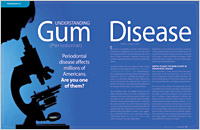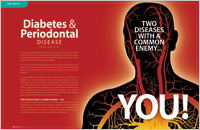Gum Disease
Get to know the basics
Taking Care of Your Gums: Why It Matters
Your teeth are important, but your gums? Equally crucial, if not more so. Healthy gums are the foundation of oral health and can even impact your overall well-being. Gum Gum disease, on the other hand, is the unwelcome guest you don’t want lingering in your mouth. Let’s dive into why taking care of your gums is such a big deal.
Understanding Gum Disease
Gum disease, also known as periodontitis or periodontal disease, occurs when bacteria in your mouth cause damage to the tissue supporting your teeth. Left unchecked, it can lead to tooth loss. Think of it as a relentless intruder slowly wearing down your gum line and loosening your teeth.
Don’t confuse gum disease with gingivitis, though. Gingivitis is an earlier stage marked by gum inflammation—it doesn’t always progress to full-blown gum disease, but it’s a clear warning sign that something’s not right.
Symptoms to Watch For
There are a few signs that can happen if you are getting or have gum disease. Swollen, irritated, or inflamed gums.
Bleeding gums when brushing or flossing.
Persistent bad breath that doesn’t go away.
Pain or discomfort when chewing.
Sudden tooth sensitivity.
Receding gums that make your teeth look longer.
Pus around your gums (yes, it’s as unpleasant as it sounds).
Jaw infections or swelling, especially near the gum line.
If left untreated, gum disease can damage the tissue and bone supporting your teeth, potentially leading to loose teeth—or worse, tooth loss.
The Role of Plaque in Gum Disease
The main culprit behind gum disease? Dental plaque. This sticky, invisible film coats your teeth and is full of bacteria. Brushing and flossing can remove plaque, but if neglected, it hardens into tartar. Tartar is so stubborn that only a professional cleaning can get rid of it, which is why routine dental visits are non-negotiable—even if you’re diligent about flossing.
Other factors can increase your risk of gum disease, including smoking, genetics, diabetes, certain medications, and hormonal changes. Be sure to share your medical history with your dentist so they can better understand your risk and tailor your care.
Your gum health is a vital part of your overall wellness. By adopting healthy habits, staying informed, and working closely with your dentist, you can reduce the risk of gum disease and enjoy the benefits of a healthy, confident smile. Remember, consistent care today leads to long-term rewards for your teeth, gums, and wellbeing. Take action and protect your oral health—it’s an investment in your future.
Preventing Gum Disease: The Basics
Preventing gum disease is simpler than you might think. Follow these steps to keep your gums healthy:
Brush your teeth twice a day with fluoride toothpaste.
Floss daily to remove plaque between your teeth.
Visit your dentist regularly for professional cleanings.
Quit smoking—it’s one of the top risk factors for gum disease.
Maintain a healthy diet to support overall oral health.
When to Contact Your Dentist
Don’t wait until your symptoms worsen. Your dentist is your partner in maintaining gum health and can recommend tailored solutions, such as professional cleanings or medicated treatments. For advanced cases, more intensive periodontal procedures may be necessary to halt the progression of gum disease.
Treating Gum Disease
If gum disease does develop, don’t panic—it’s treatable. Your dentist may recommend one or more of the following options:
Deep Cleaning (Scaling and Root Planing): A thorough cleaning to remove tartar from above and below the gumline, followed by smoothing the tooth roots to prevent bacteria buildup.
Laser Therapy: Some dentists use lasers to remove plaque and tartar with less swelling and discomfort than traditional methods.
Medications: In some cases, antibiotics or other medications may be prescribed to reduce infection and inflammation.
Gum Health Facts You Need to Know
Gum disease affects nearly half of adults over the age of 30 in the United States.
Poor oral hygiene, smoking, stress, and hormonal changes (such as pregnancy) increase the risk of gum disease.
Early stages of gum disease, known as gingivitis, are reversible with proper care and treatment.
Don’t Ignore the Signs
Your gums are the foundation of a healthy smile, so don’t overlook any warning signs. If you notice gum irritation, bleeding, or other symptoms, schedule a dental checkup as soon as possible. Regular care and attention will not only protect your gums but also ensure your smile stays healthy and vibrant.
Because let’s face it—a healthy smile is always in style.
Causes of This Disease
Dental plaque is the primary cause. Plaque is the colorless substance on your teeth that can make them feel sticky or gritty. When you brush and floss, you're getting rid of the plaque. Not removing this substance can allow it to harden, which becomes tartar. Tartar isn't able to be cleaned from your teeth with brushing or flossing. You have to have a professional cleaning to remove it. This reason is why regular dental cleanings are recommended, even for people that brush and floss regularly.
There are a number of additional factors that can increase your risk. These factors can include your behaviors, such as smoking or taking particular medications. Other risk factors are health-related, such as it being genetic or conditions like diabetes or female hormone changes. Be sure to let your dental professional know about these factors during your next visit.
Preventing Gum Disease
The best prevention for gum disease is to eliminate risky behaviors, such as smoking, and promote healthy practices, such as brushing and flossing regularly. You'll also want to go for regularly scheduled dental cleanings to keep your tartar to a minimum.
Gum Disease Treatments
There are a few treatments for this condition, and often, your dentist will decide on how to handle your treatment based on how early or late it was caught.
There is a deep cleaning method. This deep cleaning method is called scaling and root planing. It is one of the most commonly used treatment methods. Scaling is removing the tartar on your teeth. This tartar is not where you can reach it, as it's not only above your gum line but also below it. In root planing, any places that are rough where germs may gather are removed. This procedure helps to prevent the bacteria from continuing to be a problem in the pockets around your teeth.
Some dentists are using lasers to remove plaque and tartar. The use of the laser can help to reduce the amount of swelling, bleeding, and discomfort from other deep cleaning methods.
Some medications can be used for the treatment of gum disease depending on your situation.
Are you concerned that you may have gum disease or are worried about your overall oral health? Contact someone on your dental team today to schedule an appointment for a checkup. You'll be happy that you did and your smile will show it.
Related Periodontal (Gum) Disease Articles
 The Link Between Heart & Gum Diseases
The Link Between Heart & Gum Diseases
Inflammation has emerged as a factor that is involved in the process of Cardiovascular Disease (CVD), which commonly results in heart attacks and strokes. While the precise role inflammation plays in causing chronic CVD remains an area of intense current investigation, much more is now known. The good news is that, based on current research, we know that if we can reduce the inflammation caused by periodontal disease, we can reduce the risk for heart attacks and strokes... Read Article
 Understanding Gum (Periodontal) Disease
Understanding Gum (Periodontal) Disease
Have your gums ever bled when you brushed or flossed? This most commonly overlooked simple sign may be the start of silent (periodontal) disease leading to tooth loss. Learn what you can do to prevent this problem and keep your teeth for life... Read Article
 Diabetes & Periodontal Disease
Diabetes & Periodontal Disease
Diabetes and periodontal disease are chronic inflammatory diseases that impact the health of millions of people. What you may not know is that diabetes and periodontal disease can adversely affect each other... Read Article
 Warning Signs of Periodontal (Gum) Disease
Warning Signs of Periodontal (Gum) Disease
This article provides the warning signs of periodontal (gum) disease. Don't wait until it's too late... Read Article



